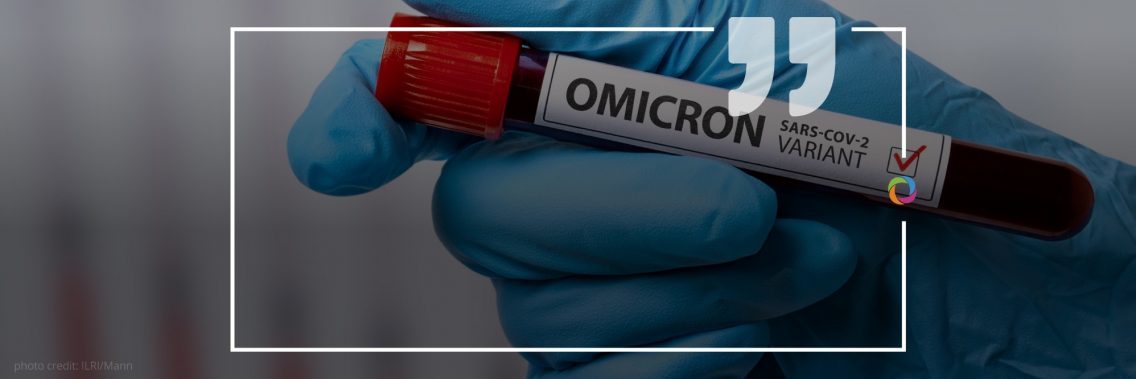Almost a year after the first COVID-19 vaccine was approved by the World Health Organization, a sense of fear has again struck much of the world. The Omicron variant of the coronavirus, first publicly identified in November 2021, may circumvent the defense built up by vaccines or past-COVID infection. Only recently, the OECD warned that as the Omicron coronavirus variant threatens the global economic recovery because it lowered the growth forecast for 2021, there should be a swifter rollout of COVID vaccines. We have gathered the latest expert opinions about this new variant and invite you to check out their insights below.
Key Takeaways:
-
- The Omicron coronavirus variant threatens the global economic recovery as it lowered the growth forecast for 2021
- Poor access to COVID-19 vaccines among populations in low and middle-income countries is labelled as the biggest misstep the international community has made in relation to the Omicron variant
- A growing number of developed countries may be forced to offer new emergency financial support to businesses and homes because of the Omicron variant
- If the severity of infection varies in some countries leading to
significant levels of hospitalization and deaths or vaccine failures, a restructuring of the vaccine may be a requirement.
What have been some of the international community’s mistakes with regard to the Omicron variant?

“The biggest mistake the international community has made in relation to the Omicron variant is failing to be prepared. We are two years into the pandemic but have yet to build resilience within our health systems to respond to waves of the virus through strengthening surge capacity, testing, surveillance, health information systems, therapeutics, vaccines and other public health mitigation strategies. Fundamentally, we continue to ignore the reality that we are willfully facilitating the conditions for the emergence of new variants through the continued denial of access to COVID-19 vaccines for populations in low and middle-income countries. Less than half the world’s population is vaccinated, meaning billions of unvaccinated people provide a conducive environment for the virus to circulate and subsequently mutate. Dr Tedros Adhanom Ghebreyesus (Director General, WHO) expressed it best when he said ‘no one is safe until everyone is safe’ and we are witnessing the realization of this prophetic statement. High-income countries have absorbed the vast majority of the vaccines produced, have initiated debatably premature booster dose campaigns for general populations without due regard for our health care workers, families, colleagues and friends in low-income countries who are yet to access their primary vaccine shots. It’s a self-defeating approach. Specifically, in relation to Omicron, the ostracizing of countries in Southern Africa with travel bans in response to the discovery of the variant sent an important message to the scientific community who may be increasingly reticent to sound the alarm when future variants of concern emerge.”

“The international community has comprehended that Omicron will have a devastating scenario similar to the Delta variant of SARS-CoV-2 virus. But experience from South Africa indicates that although infectivity was high, the disease is mild. Most of those infected cases were among the younger population. Secondly, the international community thought that the existing vaccines would not be able to counter the severity of disease but this appears to be not correct.”
How much of a threat is the Omicron variant to the global economy?

“No one can yet fully know what the impact of Omicron will be on our economies. We are seeing travel restrictions and phased lockdowns being implemented across the globe at a time when businesses were undoubtedly hoping to recoup some of their losses throughout the Christmas and New Year holidays. The impact on livelihoods is palpable most especially in countries where social security measures are absent and where work performed today feeds the family today.”

“Many countries, including India, have been forced to revise their travel guidelines due to this new type of variant SARS-CoV-2 virus. Some countries are also exploring the introduction of new curbs as more cases appear around the world. However, senior experts believe that the new variant has become quite widespread and it is simply a matter of time before it appears in many countries. Leading economic think tank, the Organization for Economic Co-operation and Development (OECD), has said western governments may be forced to bring new emergency financial support to businesses and homes if the Omicron coronavirus variant causes significant global restriction and shutdowns.”
What are the best and worst-case scenarios of the Omicron variant?

“We cannot yet have any certainty about the best and worse-case scenarios in terms of Omicron. Multiple hypotheses are emerging about this variant of the coronavirus, at the time of writing this in late December 2021. We are seeing increased transmissibility, however, so far, we are not seeing the same rise in hospitalizations we saw with other variants although this may change. Omicron has a distinctive combination of more than 50 mutations which may potentially assist it to evade immunity and increase the risk of re-infection. The newest research also indicates Omicron does not infiltrate lung tissue in the same way as previous variants, which may be why illness appears ‘milder’. The story for vaccine efficacy against the Omicron variant is complex and still under research. A primary series of vaccination with viral vector vaccines appear to fare poorly, a primary series of M-RNA vaccines still offers protection but is severely reduced. A third dose in addition to a primary series of an M-RNA vaccine does appear to stimulate an improved antibody response. Positively, a primary series of vaccinations with an M-RNA vaccine is still found to be protective against severe disease and hospitalization with Omicron. If we look to South Africa, we see hospital admissions were lower with the wave of the Omicron variant than when other variants were dominant. However, the South African experience cannot necessarily be applied elsewhere given the young demographic. We are witnessing Omicron gaining dominance across countries due to its transmissibility. Even if its effects are milder than other variants, the sheer volume of people potentially infected could mean the small fraction of those who become ill places severe pressure on hospitals. For now, continuing with mask wearing, physical distancing and vaccination remains the backbone to managing the response to Omicron.”

“Best scenario: Omicron uniformly produces mild infections to all without much hospitalization and death in every country. This could be either due to the effect of existing vaccination or earlier natural infections or it is the inherent characteristic of this variant virus. If so, stricter masking and physical distancing need to be continued for a further period along with undertaking other necessary measures. Stringent lockdowns and travel restrictions of wider geographic areas may not be necessary. Worst scenario: if the severity of infection varies in some countries with significant hospitalization and deaths or vaccine failures, a re-structuring of the vaccine may be a requirement. Restrictions, lockdown, etc. may be considered to cut down the transmission of infections.”
Check out more than 650 job opportunities in the global health sector here.


